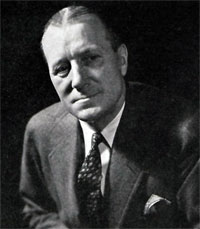Jock Sutherland
Steelers head coach 1946 - 1947
 Dr. John Bain (Jock) Sutherland's life story reads like one of those "success tales" that Horatio Alger manufactured in mass production many, many years ago. For here was a man who came to this country forty years ago at the age of 18, and stayed to find it the land of opportunity - even though the streets were not paved with gold.
Dr. John Bain (Jock) Sutherland's life story reads like one of those "success tales" that Horatio Alger manufactured in mass production many, many years ago. For here was a man who came to this country forty years ago at the age of 18, and stayed to find it the land of opportunity - even though the streets were not paved with gold.
The tall, ramrod-straight coach left his home and family in Coupar Angus, Scotland, and settled in Sewickley, Pennsylvania, now a fashionable suburban sector on the outskirts of Pittsburgh.
He worked at odd jobs in the then remote little village before completing his secondary education at Oberlin Academy. In 1913 he enrolled at the University of Pittsburgh and, at the same time, embarked on a career that was to gain him national fame. So much has been written about the Doctor's ability as a coach that his ability as a player has been almost completely overlooked.
Jock played in the first collegiate football game he ever witnessed. His coach. Joe Duff, sent him into a battle against Navy as a substitute and he made such an impression that he became a first stringer the following Saturday. For the next four seasons, he was a standout lineman, both for Duff and Duff's successor, the fabled Glenn (Pop) Warner.
It was in these days that Jock acquired a gourmet's taste for victory. As a matter of fact, he played in only one losing game during his playing career - and that against Washington & Jefferson College in 1914. The 1916 team on which he excelled was recipient of the National Championship Award promulgated by the Helm's Athletic Foundation.
Since then, the Silent Scot practically has erased the word 'lose' from his vocabulary. A few years back, a publicist at Pitt, in the understatement of the day, summed up Sutherland's horror for losing in a nutshell. "In 1930," the publicist wrote, "Jock had his first poor year since his initial season at Pitt. He lost two games..."
As a matter of passing, it might be noted here that Sutherland also was captain of the Panthers' track team and was intercollegiate champ in the discus and hammer throws.
After receiving his degree as a Doctor of Dental Science in 1918, the good doctor enlisted in the Army and served overseas. Upon discharge, in 1919, he moved to Lafayette College where he began a football coaching career that is almost unparalleled in modern times.
He gave the Leopards of Lafayette their best football days in his five-year stay, winning 33 victories against eight losses and two ties. It was here, too, that he won his first eight Eastern championships with 'his 1921 team.
When Pop Warner left Pitt for Stanford after the 1923 season, Dr. Sutherland was called to take his place and, at the same time, fill a responsible position in the Dental school faculty.
His first season was a tough one. One newspaperman, covering the Panthers at the time, wrote that Jock's team lost games to traditional rivals and the "downtown coaches and over-enthusiastic alumni were hot after his scalp." But the reserved Scot made a notable comeback the following year and thereafter, Pitt, until Jock resigned in 1939, was recognized as one of the national collegiate football leaders.
During his 15-year stay at Pitt, Sutherland compiled an impressive record. His teams were seven times Eastern champions - 1927, 29, 31, 32, 34, 36, 37 - while the 1936 aggregation was awarded the Knute K. Rockne Memorial Trophy, emblematic of National supremacy. The Sutherland-coached Panthers won 111 games, lost 20 and tied 12. Thus, he has a lifetime collegiate coaching record of 144 wins against 28 losses and 14 ties.
Following his resignation at Pitt, Sutherland remained out of football for a year and then became the first "name" coach to switch from the collegiate to professional ranks by signing a contract with the Brooklyn Dodgers of the National Football League. He stayed along the banks of the Gowanus for two seasons and both times he missed winning the Eastern Pro title by a single contest.
Then, when World War II struck, the Doctor forgot about his beloved game and spent an entire year beating on the military "brass" doors before being accepted into the Navy. But here again he eventually ended up with sonic football players to coach.
After the War, he was lured back to the town he loved best - Pittsburgh - and signed a contract to coach Art Rooney's hitherto helpless Steelers.
Last year, he'll tell you, he had a terrible season, winning five, losing five and tying one - but fans will tell you they saw the best football, "since the Old Man left Pittsburgh in 1939."
Reprinted from the 1947 Pittsburgh Steelers media guide.
The Steelers History index>>>
Jock Sutherland - Sphinx of Football>>>
STEELERSUK>>>